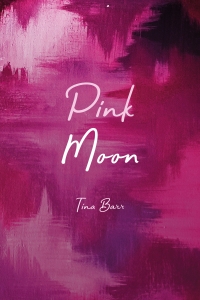Reviews
Pink Moon Inaugural Winner of the Editor’s Choice Award at Jacar Press
- For the full-length review, which is readable and not at all dense, go to this link.
"Barr, throughout Pink Moon; Inaugural Winner of the Editor’s Choice Award at Jacar Press, reminded me about the complexities of life, the heartaches, injustices, and anomalies of life. Her poems caused an inner-stirring akin to Emily Dickinson’s definition: If I read a book and it makes my whole body so cold no fire can warm me, I know that is poetry."
- Here is an intelligent and incisive review of Pink Moon by someone I did not know, but appreciate the succinct and fine review: Pink Moon Review
Green Target, Barrow Street Press, (2018) 82 pages (winner of The Barrow Street Press Poetry Prize) Selected Excerpts of Reviews below:
- Washington Independent Review of Books, December Exemplars, 2018, Best Books by Grace Cavalieri.
"Barr is inspired, every page, and fearless. For example, in 'Ghost Variations' (on a painting by Joyce Thornburg), we get horrific examples of death and decay but written as if poetry is to fulfill a purpose that cannot be organized. Instead, it must be a force that brings emotion. Perhaps this can come from vivid writing. Perhaps, also, not all dreams are good dreams and not all art is pretty. Whatever the resolve of language, Barr does not shirk from its rescue. There are also moments of illness where the body is betrayed -- a mother who must be put in diapers, a 'bulb' under the tongue, chronic fatigue syndrome turns into a Blakean poem infectious with imagery. Barr makes words soulful, and her dreams happen using every element of nature touched with human endeavor -- every grass, every butterfly is named to showcase the wild theater of her imagination."
"On display in these ekphrastic poems, and in all of Green Target, for that matter, is Barr's desire to identify the tunnels that lie beneath Johns' famous target paintings which double as a visual representation of the connective thought-processes of her poems. . . . The thirty-nine poems that Tina Barr has compiled here bring to light the relations between human and nature, both collaborative and dysfunctional. The topics touched on demand our attention as they reflect our collective situation regarding humanity's future and how we choose to both observe and potentially empathize with the world around us. . . . Green Target offers its collective audience a glimpse at harmony, cooperation, and the pressing need to target both in our own lives."
- Read a review on the Poetry Foundation website.
"It was Wordsworth who first suggested that poetry could be inspired by nature, that a writer could immerse herself in the natural world and, by paying close attention, arrive at a kind of verse that 'takes its origins recollected in tranquility.' Barr's speaker is an impeccable observer of the natural world, but she is hardly tranquil, especially in the first fraught months of rural life. 'One worries in the mountains,' she says. Barr's landscapes are violent with life, redolent with nature's teem and seethe: the goldenrod 'seeds our heads with bites from some insect' while brambles' thorns 'scrape bar pins of blood on my forearms.' Snakes lurk everywhere--in the grass near walking paths or twined inside of the compost bin: Garter snakes, black and harmless, and copperheads, beautiful and lethal, even in death when its 'jaws kept opening like a Venus Flytrap's mouth.' Nature here is its own speeding automobile--it's best to always look both ways and be mindful of where one treads. . . ."
- Louisiana Literature, by Aisha Sharif, Summer, 2020, 37.1
"Many poems begin with Barr presenting disparate images that are woven together by the end of the poem . . . . In these lines (the poem 'Threat'), readers are taken out of the earlier focus on nature and are presented with images of the police, a drowning child, and Muslim men praying in Egypt and Saudi Arabia. Yet, these images ... are also reflective of another kind of 'nature,' the 'nature' of ... police surveillance, untimely death, Islamic prayer ... This poem, as with many of the poems in the book, asks us to leap without a net into imagery and observations, to trust that, in the process of understanding how we target and are targeted, the connections will come, that meaning, like nature and death, will always reveal itself."
Kaleidoscope, Iris Press (2015) 84 pages (finalist for The Eric Hoffer Award) Selected Excerpts of Reviews below:
- Washington Independent Review of Books, by Grace Cavalieri, June, 2015
"Kaleidoscope is a great title because we come to poems from angles emotional with color -- a joyful dedication to her art -- always with new possibilities. Each poem is, by design, some elevated ideal on poetry's stage. Here are observations and new awarenesses that make a huge difference. Barr is not interested in public debate or controversial issues; she is not a poet of opposition and struggle. Hers are small hymns, lucid and centralized. Poets all use the same material. It's who they are, as individuals, that makes the stuff of art. She may write of a 'great aunt who slept with her stepfather,' or a 'strangler in the neighborhood' but she turns these into works of lyrical beauty. In 'Dessert:'"
- "...My grandmother's voice, high-boned,
drifted in smoke as her legs crossed and uncrossed.
My hands in my velvet lap turned her pearls; I wore
black patent shoes with a button hard to push through.
Waiters flourished lamb chops; frills dressed their bones.
I chose from a cart. Strawberries nestled in yellow cream,
the fluted edge of pastry, crust like shortbread.
Strawberries glazed under sugar, berries bedded in rows.
My grandmother crossed Park, got hit by a car, and thrown."
It takes a champion to write like this -- to house tragedy within the perfect picture of elegance. We need her. We need her imagery. In "Shiny Brite" Barr speaks of the horrors of Nagasaki, the rapes of Okinawa, and transforms with the end stanza, "...My mother changed the subject; her not-love stung in little verbal clots, like milk in a woman/ whose breast burst a white lump the size of a/ summer orange from glands plugged with the burning./ Mandarin oranges grew in Kagoshima./ We found them in the toes of Christmas stockings./ My mother fed me segments in syrup from a can/ as the bombs dropped from the Christmas tree."
- Appalachian Journal, by Jesse Graves, Issue 43, 2015
"Some of these poems come from a lineage stretching from Dickinson to Plath to Anne Carson, but Barr makes them her own with her unmistakable voice and indelible images. Barr evokes a distinctive Appalachian Gothic sensibility in her work, full of gorgeous and terrifying surprises in every line."
- Poetry South, by William Wright, Issue 7, 2015
"Tina Barr's Kaleidoscope is a collection of lyrically-dense poems, their richness of imagery counterbalanced with delicate handling of difficult material. These qualities are evident in the opening poem 'Cave of the Glowing Skulls' where the interior of a burial chamber serves as a reminder of the living and the dead. The images Barr offers up are vivid, yet otherworldly: 'Caves of seashells ring this inland chamber/with coral shelves to store the small vessels'. Here, as elsewhere in this book, Barr's sense of form gives the poem a strength beyond its own lines, a force that accumulates as the book progresses, echoing like the caves she describes."

